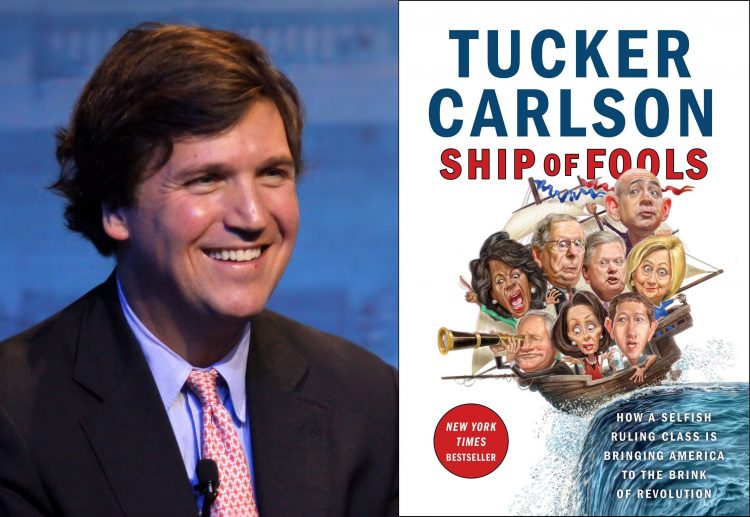Blog Post
Tucker Carlson versus the American elites
By Jonathon Van Maren
Ever since Tucker Carlson’s monologue on the American elites last week, the conservative movement has been huffing and puffing, with everyone who is anyone scrambling to get out a column-length rebuttal to Carlson’s so-called “populism.” Taking a gander at his speech, it isn’t hard to see why they’re upset. He starts off his monologue by examining Mitt Romney’s recent op-ed in the Washington Post criticizing Trump, and then noting that Romney’s only praise was for Trump’s corporate tax cut:
That’s not surprising. Romney spent the bulk of his business career at a firm called Bain Capital. Bain Capital all but invented what is now a familiar business strategy: Take over an existing company for a short period of time, cut costs by firing employees, run up the debt, extract the wealth, and move on, sometimes leaving retirees without their earned pensions. Romney became fantastically rich doing this.
Meanwhile, a remarkable number of the companies are now bankrupt or extinct. This is the private equity model. Our ruling class sees nothing wrong with it. It’s how they run the country.
I note that bit in particular because not a single response to Carlson’s monologue—not the one by Ben Shapiro, not the one by David French, and not the one by David Bahnsen—bothered to address Carlson’s key point: That vulture capitalism hurts the little guy, and that capitalism without ethics can crush small communities. The establishment conservative commentators responded to Carlson by pointing out that personal virtue and ethics were the real key to a successful life—which is very true—but completely ignored the fact that corporations functioning without ethics can crush good people as well as pot-smoking basement dwellers.
In fact, most of those responding to Carlson seemed to be so boggled by his critique of unfettered free markets that they missed his point entirely. This section in particular seemed to trigger vast amounts of ire:
The goal for America is both simpler and more elusive than mere prosperity. It’s happiness. There are a lot of ingredients in being happy: Dignity. Purpose. Self-control. Independence. Above all, deep relationships with other people. Those are the things that you want for your children. They’re what our leaders should want for us, and would want if they cared.
But our leaders don’t care. We are ruled by mercenaries who feel no long-term obligation to the people they rule. They’re day traders. Substitute teachers. They’re just passing through. They have no skin in this game, and it shows. They can’t solve our problems. They don’t even bother to understand our problems.
One of the biggest lies our leaders tell us that you can separate economics from everything else that matters. Economics is a topic for public debate. Family and faith and culture, meanwhile, those are personal matters. Both parties believe this.
Members of our educated upper-middle-classes are now the backbone of the Democratic Party who usually describe themselves as fiscally responsible and socially moderate. In other words, functionally libertarian. They don’t care how you live, as long as the bills are paid and the markets function. Somehow, they don’t see a connection between people’s personal lives and the health of our economy, or for that matter, the country’s ability to pay its bills. As far as they’re concerned, these are two totally separate categories.
Social conservatives, meanwhile, come to the debate from the opposite perspective, and yet reach a strikingly similar conclusion. The real problem, you’ll hear them say, is that the American family is collapsing. Nothing can be fixed before we fix that. Yet, like the libertarians they claim to oppose, many social conservatives also consider markets sacrosanct. The idea that families are being crushed by market forces seems never to occur to them. They refuse to consider it. Questioning markets feels like apostasy.
Both sides miss the obvious point: Culture and economics are inseparably intertwined. Certain economic systems allow families to thrive. Thriving families make market economies possible. You can’t separate the two. It used to be possible to deny this. Not anymore. The evidence is now overwhelming.
Carlson went on to point out the obvious: That the system favors those who can pay the most into it:
Under our current system, an American who works for a salary pays about twice the tax rate as someone who’s living off inherited money and doesn’t work at all. We tax capital at half of what we tax labor. It’s a sweet deal if you work in finance, as many of our rich people do.
In 2010, for example, Mitt Romney made about $22 million dollars in investment income. He paid an effective federal tax rate of 14 percent. For normal upper-middle-class wage earners, the federal tax rate is nearly 40 percent. No wonder Mitt Romney supports the status quo. But for everyone else, it’s infuriating.
Our leaders rarely mention any of this. They tell us our multi-tiered tax code is based on the principles of the free market. Please. It’s based on laws that the Congress passed, laws that companies lobbied for in order to increase their economic advantage. It worked well for those people. They did increase their economic advantage. But for everyone else, it came at a big cost. Unfairness is profoundly divisive. When you favor one child over another, your kids don’t hate you. They hate each other.
That happens in countries, too. It’s happening in ours, probably by design. Divided countries are easier to rule. And nothing divides us like the perception that some people are getting special treatment. In our country, some people definitely are getting special treatment. Republicans should oppose that with everything they have.
I’ve been following Tucker Carlson with great interest for quite some time. Not his nightly show, mind you, which I find as predictable as the rest of the FOX shows, although more palatable than Sean Hannity’s. But in his recent book tour consisting of speeches across the US, Carlson has been examining what is going on in America at present. After all, as he consistently points out, happy, contented countries don’t elect Donald J. Trump as the president of the United States.
Carlson’s soul-searching in the wake of Trump’s election produced his latest book: Ship of Fools: How a Selfish Ruling Class is Bringing America to the Brink of Revolution. (Reading it reminded me that Carlson is a great writer, and it is a shame that he turned in his pen for primetime. Christopher Hitchens once urged him to resist the temptation to exchange journalism for TV, and I wish he’d listened.) Carlson’s contribution to the ongoing discussion of what happened is fascinating for many reasons, not the least of which is the fact that he unharnesses himself from ideology and allows himself to go where observation takes him.
In the wake of Trump’s election, he notes, America’s ruling class should be looking for a glue strong enough to hold 330 million people together. Shared values grounded in America’s founding documents used to serve that function. That is, quite obviously, no longer the case. The Left has proposed (and is attempting to impose) “diversity” as the new over-arching value, but as Carlson points out, “diversity” is not a value. It is a neutral description. And then there’s the fact that by “diversity,” the Left means people who look differently but think precisely the same. Those who disagree with them, in fact, get almost immediately demonized. The title of one of Carlson’s chapter sums it up: Shut up, they explained.
Immigration, obviously, has become the key issue in American politics. For decades, the American public was expected to accept high rates of immigration, and then illegal immigration. Most people, Carlson points out, simply cannot accommodate change at that pace, and will often embrace tribalism in response. The ruling elites, on the other hand, benefited enormously from these policies. The Democrats wanted immigrant voters. Republicans wanted cheap labor. The donor class was happy, even if nobody else was. Polls indicate that loose immigration policies and enforcement are wildly unpopular with everyone but the ruling class (Douglas Murray noted precisely the same thing about European populations in his 2017 book The Strange Death of Europe.)
Meanwhile, the escalating crisis in the American heartland has been progressing nearly unnoticed for decades. Between 1999 and 2017, the rates of opioid addiction went up by 400%, resulting in an annual death rate higher than the casualty count of the Vietnam War. These people were unhappy, they were failing at life, and they were ignored by the ruling class. Countries can survive anything, Carlson writes, except for leaders who despise the people they rule. After all, the rich don’t plan to be around for the crash. Many of them have begun to live like rootless cosmopolitans with more connection to those of their class than those who share their country.
Those who think that Carlson may be engaging in hyperbole to make a rhetorical point should take the time to read the New Yorker’s 2017 essay “Doomsday Prep for the Super-Rich,” in which Evan Osnos describes the backup plans of the American elites. Steve Huffman, the thirty-three-year-old co-founder and C.E.O. of Reddit (valued at 600 million dollars), got laser eye surgery so he would be better prepared for potential social collapse. He is concerned about “the temporary collapse of our government and structures,” and thus has “a couple of motorcycles” as well as “a bunch of guns and ammo” on hand just in case. One former Facebook product manager has an entire island in the Pacific Northwest outfitted with generators, solar panels, and everything else he might need for when “society loses a healthy founding myth” and “descends into chaos.” According to Osnos, these sorts of preparations are the norm rather than the exception.
Civil strife, Carlson believes, is far more likely when most “normal people” perceive their political options as being on the same team, and when they feel that the policies of both Republicans and Democrats benefit the same people. At some point, he writes, there are only two groups: Those who benefit from the status quo, and those who don’t. That is why Trump’s election was a rebuke to the establishment of both parties, and why so many leaders are responding with hysteria. The elites, writes Carlson, feel entitled. They believe they are better, and that they are rich because they are better. Too many of them fail to recognize the role that providence plays in placing them in their prestigious position in life.
Interestingly, Carlson theorizes that the defection of the big corporations from the Republican Party to the Democratic Party may be partially due to the fact that the elites are using virtue-signalling on so-called progressive social issues to mask the enormous inequality they preside over. Corporate America has defected almost entirely to the Democratic party, with 8 of the 10 most affluent counties voting for Hillary and the rich backing her almost universally. Corporate America pretends to care about progressive issues by wrapping itself in the rainbow flag while refusing to address inequalities it actually has control over, which is why you have the gay CEO of Apple trumpeting his social views while running a company that horribly mistreated Chinese workers with skyrocketing suicide rates creating iPhones in awful conditions, or the founder of Uber using his app to lecture users on various social issues while refusing to take responsibility for those who run his service (many of whom actually lose money, and none of whom get healthcare benefits.)
It is a brilliant strategy: These social positions cost the elites nothing, people feel as if they’re on the “right team” by buying their products, and nobody ever asks them any questions about how they’re treating the workers, who are often getting screwed. Nobody asks the foot soldiers and funders of the LGBT revolution what is going on in the factories—that would be a rude way to treat an ally.
Perhaps one of the reasons that some of the Silicon Valley tech giants are preparing for civil war (their words, not mine) is that they know their products are hurting America. Corporations know that social media addiction has profoundly negative effects, but still brainstorm ways to get you to spend more time on their platforms. Facebook’s internal documents indicate that the social media bosses know their product is addictive and making people unhappy, but that they are using this information to hook people further. Social responsibility has no place in their business model. Money is more important than people, and the market gods are happy even if nobody else is. Social media has not brought us together. It has deepened the chasms between us.
The Democrats, Carlson writes, were once the party of the middle class and actively fought for the working man. In 1975, for example, California Governor Jerry Brown—yup, that Jerry Brown—opposed the immigration of hundreds of thousands of Vietnamese boat people to his state after the fall of Saigon because it would hurt jobs. Joe Biden—yup, that Joe Biden—backed him. This opposition was based on the simple understanding that mass influxes of people could hurt the American worker. But in a few short years, the Democrats abandoned these platforms and became the party of welfare recipients, the very rich, and illegal immigrants. They made a calculation that these voters could deliver for the Democratic party. They were correct.
Ironically, the very elites that crow about diversity don’t prefer it in their own lives. The richer you are, Carlson points out, the whiter your neighborhood is likely to be. The whiter your neighborhood is, the more socially “progressive” it is likely to be. People like Samantha Bee, who claim that white people ruined everything, move to areas populated primarily by white people and send their kids to schools with only white people as soon as they have the money to do so. For example, only 4% of the people in the Obama’s neighborhood are black. Perhaps the elites have redefined immigration as a moral issue (meaning you are a racist and a bigot if you oppose open borders) simply because they want housekeepers and landscapers. These policies, Carlson savagely insinuates, have revived “America’s servant class.”
When progressives bash white people—the progressives in question often being white themselves—they are generally bashing poor white people, not the socially enlightened members of their own class. Poor white men are at the bottom of the social totem pole. Men now account for 77% of the suicides, 90% of the prison inmates, they are more likely to become alcoholics, and they die an average of five years earlier than women. Between 1979 and 2010, working men with high school degrees saw their wages drop 20%. Seven million men between 25 and 54 no longer have jobs. Automation such as driverless cars could wipe out even more, and 90% of what welders, cutters, solderers, and brazers do could soon be automated. Men get married less, and stay married less. Over 70% of American men are either overweight or obese. Even sperm counts across the West have fallen by 60% since 1970—and lower testosterone rates are associated with depression and weight gain. Nothing like this has ever happened before, and nobody wants to talk about it.
It is true, as most of the responses to Carlson’s monologue (which summarize the themes he examines in his book) state, that the cultivation of personal virtue, a good work ethic, and greater personal responsibility are essential to addressing most, if not all of these problems. (The only rebuttal I found eloquent and persuasive was, as is typical, that of Kevin D. Williamson.) But Carlson is not disagreeing with that, as far as I can tell. He is simply pointing out that there are economic conditions facilitated by some to the disadvantage of the majority that contribute substantially to these problems. Perhaps vulture capitalism and the free market unhitched from corporate responsibility contribute to the very family breakdown and subsequent loss of faith that Carlson’s critics highlight as the real problem we should be pointing to. As Carlson pointed out in his brilliant interview with Ben Shapiro some time ago, the economics of the free market should not be treated like a religion.
Ship of Fools is Tucker Carlson’s attempt to trigger a discussion about where America is headed, and why the establishments of both parties are to blame. Middle America may keep on electing populists until their concerns are addressed, he noted. Just because it was Trump this time doesn’t mean it won’t be some Bernie Sanders type the next time around. If identity politics isn’t curbed, white identity politics will surge—if it is the only game in town, eventually everyone will get in on it. If we don’t find some way to address the decline of men, families will continue to disintegrate (1 in 5 American children live with their mothers) and America will continue to suffer for it. An open debate must be had, and establishment conservatives will have to put some of their ideological hobby horses on hold in order to listen more carefully to what is actually being said.
_____________________________________________________
For anyone interested, my book on The Culture War, which analyzes the journey our culture has taken from the way it was to the way it is and examines the Sexual Revolution, hook-up culture, the rise of the porn plague, abortion, commodity culture, euthanasia, and the gay rights movement, is available for sale here.








